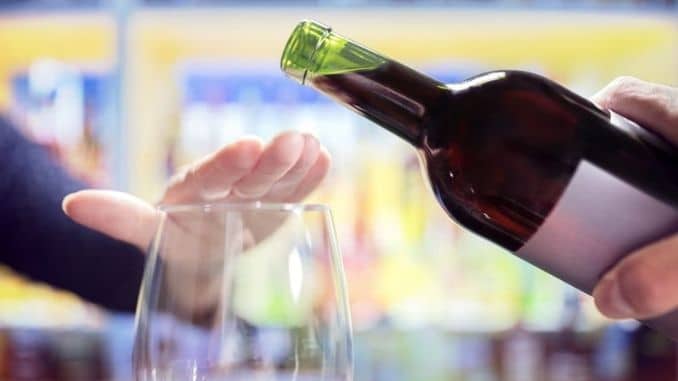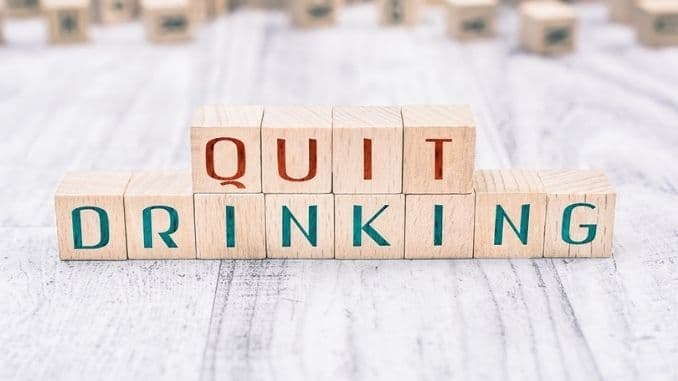
The decision to quit drinking can truly change your life. If you know that you drink more than you should or loved ones have told you that they are concerned about your drinking habits, it’s probably time to consider making a change.

Do You Have a Drinking Problem?
Before we go any further, let’s determine the severity of the situation. If you have a glass of wine a couple of times each month. You don’t experience any alcohol-related problems, you likely don’t need to worry about being dependent or addicted to alcohol.
On the other hand, there are behaviors that can indicate a drinking problem. The team at Alcohol Rehab Guide has identified eight common symptoms of alcohol dependency. Here is their list:
- Blackouts or memory loss when drinking
- Mood swings or irritability when sober
- Giving excuses for drinking like stress, dealing with kids and so on
- Choosing to drink rather than tend to personal obligations or responsibilities
- Isolating yourself from friends and family
- Drinking alone or keeping it a secret
- Feeling unstable when you’re not drinking
- Changing your social group for reasons related to alcohol
If these behaviors or symptoms describe your relationship with alcohol, we’re here to help.
While quitting drinking is not easy, it is possible, and there are plenty of helpful techniques you can implement to help you kick the habit for good. We’ve got a few good suggestions to help you quit and considerations for your recovery.
Be Prepared for Withdrawal Symptoms
Things to Consider When You Decide to Quit Drinking: If you’re a regular drinker, and you’ve been abusing alcohol for quite a while, stopping is likely to bring upon withdrawal symptoms. Dr. Steven Melemis, the author of the book, “I Want to Change My Life: How to Overcome Anxiety, Depression, and Addiction,” wrote, “Withdrawal occurs because your brain works like a spring when it comes to addiction. Drugs and alcohol are brain depressants that push down the spring. They suppress your brain’s production of neurotransmitters like noradrenaline. When you stop using drugs or alcohol, it’s like taking the weight off the spring. Your brain rebounds by producing a surge of adrenaline that causes withdrawal symptoms.”
Withdrawal symptoms from alcohol will generally last around seven days. They are uncomfortable and can even require medical assistance and monitoring. For that reason, it is best to check into a rehabilitation clinic or stay with a trusted friend or loved one when you quit drinking. Having someone around who can help you get medical assistance if you need it is important.
The Recovery Village, a rehabilitation clinic in Umatilla, Florida, published a list of common withdrawal symptoms many people experience when they quit drinking. These symptoms include:
- Headaches
- Heart palpitations
- Seizures
- Anxiety
- Restlessness
- Confusion
- Tremors
- Nausea
- Vomiting
- Loss of appetite
- Irritability
- Mood swings
- Sweating
- Fever
The experts at The Recovery Village also warn, “Some alcoholics going through withdrawal may experience a very severe set of symptoms called delirium tremens. Delirium tremens most commonly occurs in those who drink in excess daily for months or even years.” These severe withdrawal symptoms include diminished mental functions, fear, severe seizures, profound confusion and deeper than usual sleep. Medical supervision is advised if you have had a long-term drinking problem and are giving up alcohol.
Withdrawal symptoms can vary from mild discomfort to extreme mental and physical anguish. While you’re going through the first few days of withdrawal, make sure you are with trusted loved ones or medical professionals.
Admit That You Have a Problem
Things to Consider When You Decide to Quit Drinking: The international organization Alcoholics Anonymous (AA) was founded in the 1930s to help alcoholics achieve sobriety and stay sober. AA is centered on 12 steps to help alcoholics work through recovery from alcoholism. AA is widely known throughout the world as a successful program for addiction recovery.
The first step in the AA program is for participants to admit they are powerless over alcohol ― that their lives have become unmanageable. This first step to admitting you have a problem with alcohol is crucial in achieving sobriety.
The truth about giving up drinking is that it’s nearly impossible to do unless you are willing to admit to yourself and others that you have a problem. My father, who died at an early age due to his lifelong alcohol addiction, was never willing to admit that he was an alcoholic. Each time he tried to quit, he would relapse ― sometimes within days. Other times, he would go for several months. However, because he wasn’t willing to recognize that he was indeed addicted to alcohol, he fell off the wagon and gave in to his addiction repeatedly.
According to the experts at American Addiction Centers, “Denial is a large part of addiction, and breaking through self-deception can be very difficult. Many addicts have to reach a low point before they accept that their drug use is a serious problem in their life.”
If you have identified with any of the above indicators of alcohol addiction or drinking problem, admit to yourself that you have an addiction. Admit it to a trusted loved one too. Recognizing the problem is the first step to achieving sobriety.
Make It Public
Things to Consider When You Decide to Quit Drinking: When you’ve decided you’re going to quit drinking, tell your friends and family. Post it on your social media accounts and be open about your decision. Telling your loved ones about your decision to give up alcohol gives you some instant accountability. The chances are good that someone you know has also made a choice to stop drinking and is in recovery. Also, when you share your goal to achieve sobriety. Your friends will probably not invite you out to bars or events that are centered on drinking.
Toss the Booze
Things to Consider When You Decide to Quit Drinking: Once you’ve resolved to stop drinking for good, clean out the liquor cabinet. Throw out all of the alcohol in your home, including cooking wine. If you have an alcohol dependency. It’s all too easy to reach for a drink when you’ve had a rough day. If alcohol isn’t available in your home, you are less likely to fall into old habits.
In your community or a community nearby, other people meet together and support each other in their desire to achieve sobriety and stay sober. Search online to find a chapter of Alcoholics Anonymous near your home. Many churches and community centers also offer addiction recovery support groups you can join.
There is a myriad of benefits to attending support groups when you’ve decided to quit drinking. First of all, when you attend a support group with other alcoholics, you’ll find that many of them suffer from the same types of struggles you have experienced during the process. Often, you’ll attend AA with someone who has similar temptations and triggers.
You’ll likely meet someone sober longer than you and is willing to offer their friendship and support to you during the first few days, weeks and months of your sobriety. In the AA program, newcomers are paired up with sponsors, or trusted individuals, who have worked through the program and have remained sober for a significant amount of time. Having a sponsor who you can call when you feel like drinking is a helpful benefit to joining a recovery support group.
Another benefit to attending support group meetings is listening to the life stories of others who have experienced pain and loss because of their addictions to alcohol. For a 30-something who has just entered into recovery, hearing the cautionary tales of someone in his or her 50s who has suffered the loss of a marriage, job loss or excommunication from family can be an eye-opening experience.
Know Your Limitations
Things to Consider When You Decide to Quit Drinking: If you know your old college roommate is having a pub crawl for his bachelor party. You may want to decline the invitation graciously. When a group of friends is going out with the sole intention of getting drunk. It may be best for you not to join in.
If your circle of friends assumes that since you’re no longer drinking. You’ll be their all-time designated driver, so you may need to correct them. Chances are good that you will fall back into drinking if you’re accompanying your friends to bars and parties where alcohol is being served.
Beware of Alcohol in Unlikely Situations
Baby showers, book clubs, kids’ activities ― many times, even seemingly vanilla gatherings can be places where people are serving alcohol and drinking. When you’re going to an event, and you’re unsure if there will be an open bar, take along a friend who also doesn’t drink. This way, you’ll ensure that you’re not the only person there that won’t be drinking.
Eat Well
Getting excellent nutrition will help you immensely when you decide to give up drinking alcohol. When your body is properly nourished, you won’t feel a pull toward the simple sugars that alcohol provides.
Don’t Skip Meals When You’ve Quit Drinking
Not eating breakfast or skipping lunch can cause your blood sugar to plummet. Low blood sugar, or hypoglycemia, can trigger alcohol cravings.
Sobriety coach Cynthia Perkins says, “The reason that alcoholism and hypoglycemia are interconnected is that alcohol is sugar ― the most highly refined sugar that can be consumed. When blood sugar drops, then cravings for alcohol emerge to bring the blood sugar levels back up and eliminate the accompanying uncomfortable symptoms.”
Eat your three squares and plenty of snacks to stay well-nourished and avoid unstable blood sugar levels during your recovery.
Take Steps to Quit Drinking
If you know it’s time to give up drinking, take into account this list of tips and considerations to help you stop drinking for good.
For the best foods to help heal your body, check out The Best Foods that Rapidly Slim & Heal in 7 Days, here!





